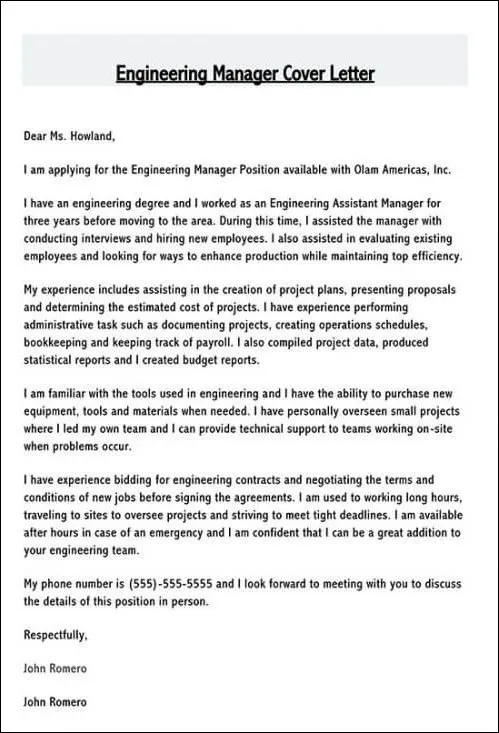Why a Strong Engineer Cover Letter Matters
In the competitive field of engineering, a well-crafted cover letter is your initial opportunity to make a lasting impression. It’s more than just a formality; it’s a crucial tool that can significantly impact your job application’s success. A compelling cover letter provides a space to go beyond your resume, offering insights into your personality, enthusiasm, and the unique value you bring to a company. It allows you to showcase your communication skills, a vital asset for any engineer. A well-written cover letter highlights your understanding of the role and the company’s needs, demonstrating that you’ve taken the time to research and tailor your application, which separates you from generic applicants. A strong cover letter is not merely a summary of your resume; it’s a narrative, a chance to connect your skills and experience with the specific requirements of the job, and the company culture. For any engineering position, the cover letter is often your first interview and first chance to present your value. So do not take this task lightly, as a proper cover letter will set you apart in an over-saturated market.
Key Components of a Winning Engineer Cover Letter
A winning engineer cover letter includes several essential components. Start with a personalized greeting, addressing the hiring manager by name, if possible. The opening paragraph should immediately capture the reader’s attention, stating the position you’re applying for and expressing your enthusiasm for the opportunity. Highlight your most relevant skills and experiences in the body paragraphs. Use quantifiable achievements and metrics to demonstrate your impact in previous roles. Showcasing how your skills align with the job requirements is critical; analyze the job description carefully and tailor your letter accordingly. Include specific examples of your projects and their results, demonstrating your problem-solving abilities, technical proficiency, and your ability to work collaboratively. A clear and concise closing paragraph reiterates your interest, summarizes your key qualifications, and includes a call to action, such as requesting an interview. Proofread and edit meticulously for any grammatical errors or typos, as these will reflect poorly. Make sure to mention any skills that are relevant to the job description.
Understanding the Different Types of Engineer Cover Letters
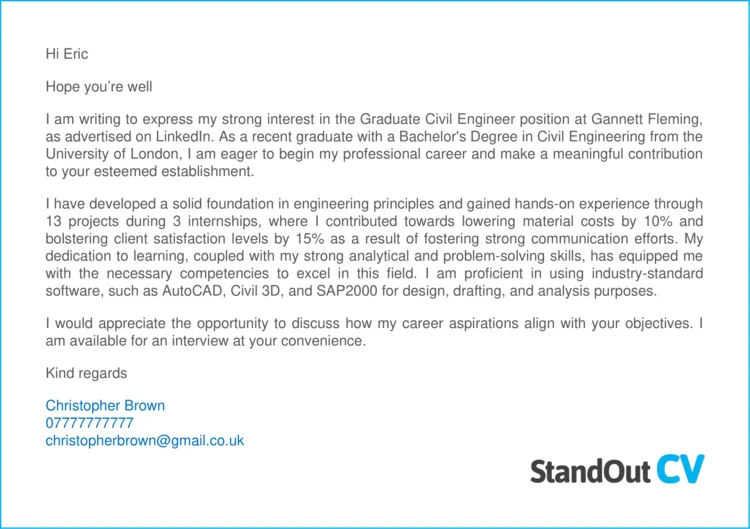
Engineer cover letters can be customized based on the type of role, the company, and the candidate’s experience. The most common types include application cover letters, which respond to a specific job posting; networking cover letters, used when reaching out to contacts or attending career fairs; and prospecting cover letters, sent to companies even when no specific job openings are available. Application cover letters should directly address the requirements outlined in the job description, highlighting relevant skills and experiences. Networking cover letters should focus on building connections and expressing your interest in the company, or even a project you admire. Prospecting cover letters take a proactive approach, showcasing your abilities and expressing your interest in the company. Regardless of the type, the key is to tailor your letter to the specific situation, showing that you understand the role and have something unique to offer the organization. Also remember to keep the length to one page.
Example 1 Mechanical Engineer Cover Letter
A mechanical engineer cover letter should emphasize technical skills and experience in mechanical systems design, analysis, and project management. Highlight your proficiency with CAD software, such as AutoCAD or SolidWorks, and any experience with simulation and testing. Showcase your knowledge of relevant engineering principles, such as thermodynamics, fluid dynamics, or heat transfer, especially if it applies to a job. Focus on projects where you have successfully designed, implemented, or improved mechanical systems. When describing these projects, provide clear examples of the issues and the outcomes. Highlight any experience with manufacturing processes, materials science, or relevant industry standards. Demonstrate your ability to collaborate with cross-functional teams and your attention to detail in project documentation and reporting. Also, include any awards or recognitions you’ve received for outstanding work. In this section, write about your past roles to highlight any mechanical engineering experience.
Skills to Highlight
Focus on skills relevant to the mechanical engineering field, such as proficiency in CAD software, knowledge of engineering principles, and the ability to analyze and solve complex problems. Also include design and analysis skills and any skills relating to materials science or manufacturing.
Projects and Accomplishments
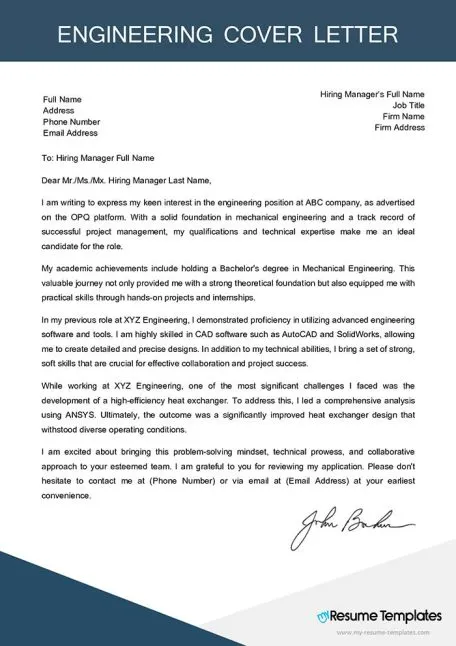
Provide specific examples of projects you’ve worked on. Include details about the issues addressed, your role, and the outcomes achieved. Show how your work led to improvements in efficiency, cost savings, or product performance. Quantify your accomplishments whenever possible.
Example 2 Civil Engineer Cover Letter
A civil engineer cover letter should focus on experience with infrastructure projects, demonstrating your understanding of design, construction, and project management. Include details about your experience with different types of projects, such as roads, bridges, buildings, or water systems. Highlight your knowledge of relevant codes and regulations, and your proficiency in engineering software like AutoCAD Civil 3D or Revit. Discuss your ability to work with clients, contractors, and other stakeholders. Provide examples of your successful project management skills, including budget management, scheduling, and risk assessment. Emphasize any experience you have with sustainable design or environmentally-friendly practices. Showcase your problem-solving skills, such as finding innovative solutions to design challenges. Demonstrate your familiarity with industry standards and best practices. Also, describe any relevant licenses or certifications you hold. Remember to use keywords in your cover letter that matches the job description.
Highlighting Relevant Experience
Focus on experience directly related to the job’s requirements. Mention specific project types, your role, and the responsibilities you held in each. Use the job description to match the needed experience and incorporate it in your cover letter.
Quantifying Achievements
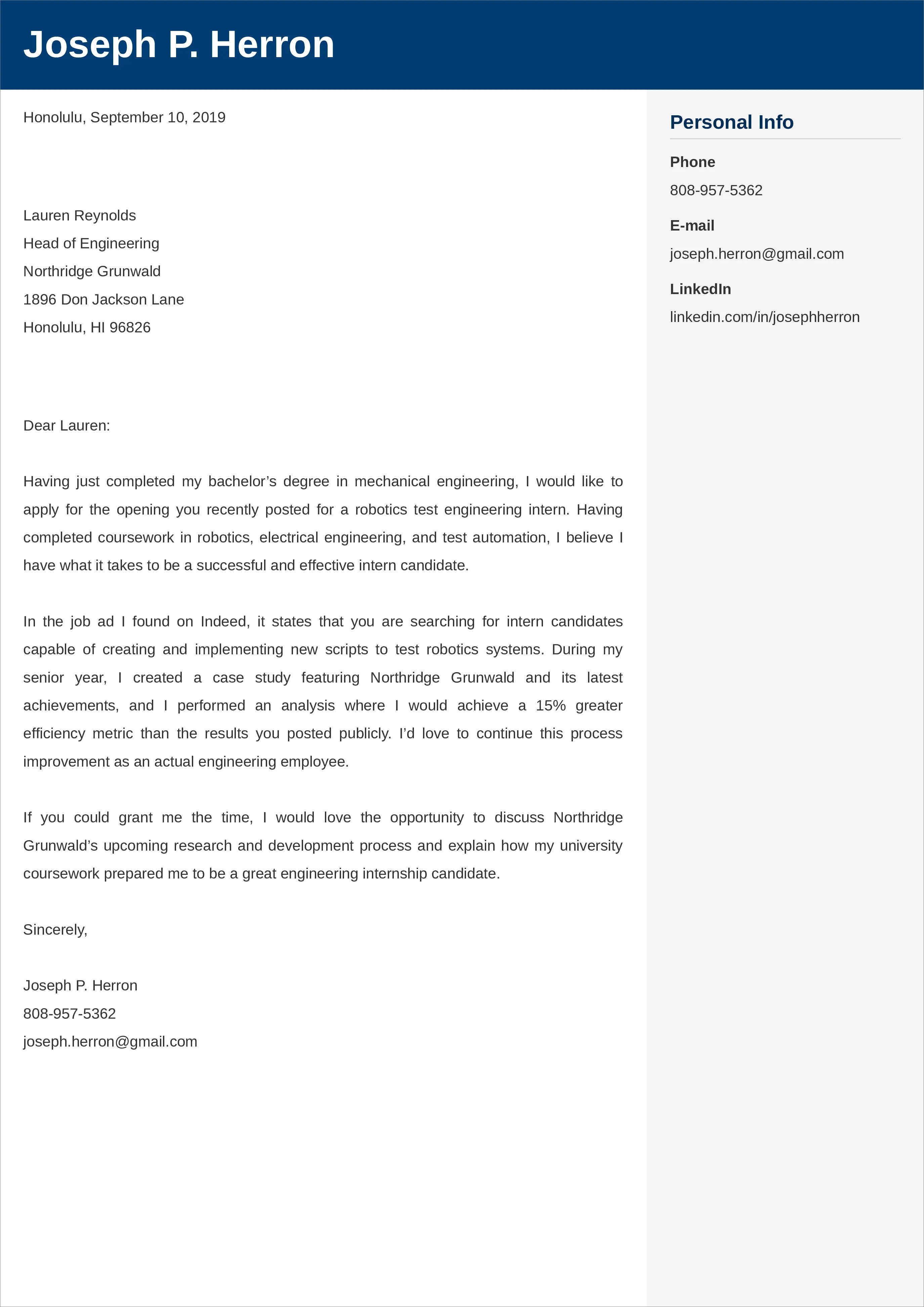
Quantify your achievements whenever possible. This may include the size of projects you have managed, the cost savings you achieved, or the improvements in efficiency you implemented. Numbers add credibility.
Example 3 Software Engineer Cover Letter
A software engineer cover letter should emphasize technical skills, such as programming languages, software development methodologies, and experience with relevant technologies. Mention your proficiency in programming languages like Java, Python, C++, and others that align with the job requirements. Showcase your experience with software development frameworks, tools, and platforms, such as Agile, Scrum, or DevOps. Highlight your ability to design, develop, test, and deploy software applications. Discuss your experience with different types of software, such as web applications, mobile apps, or embedded systems. Provide examples of projects where you have successfully developed software solutions. Emphasize your problem-solving skills and your ability to troubleshoot and debug code. Showcase your familiarity with software development best practices, such as version control and code reviews. Include details about any contributions to open-source projects or other relevant experiences. Highlight any soft skills needed for the role, such as communication and teamwork.
Showcasing Technical Skills
List your technical skills, including programming languages, frameworks, and tools. Mention any specific technologies or platforms that match the job requirements, such as cloud computing, databases, or specific software tools.
Addressing Specific Job Requirements
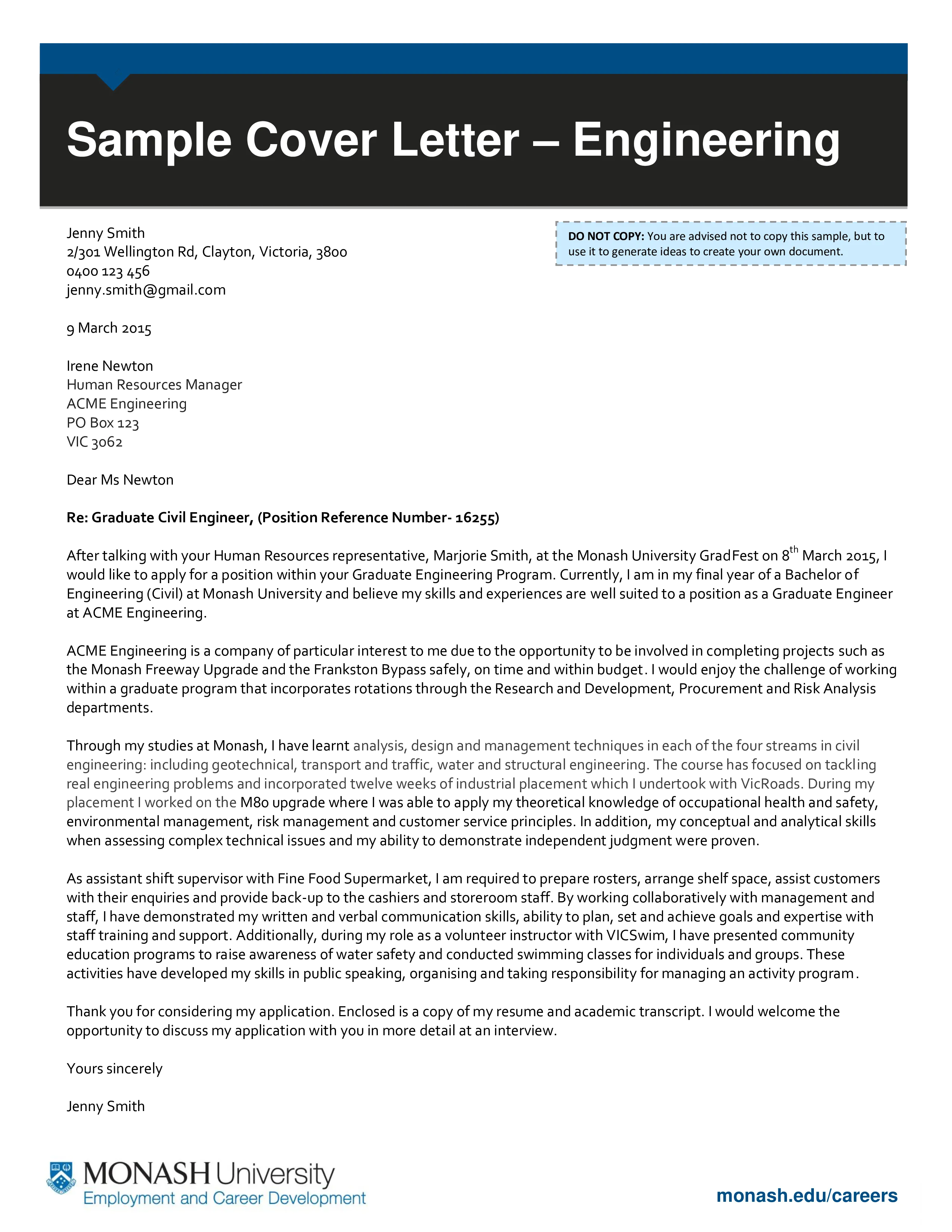
Carefully review the job description and tailor your cover letter to highlight skills and experiences that match the specific requirements. Use keywords from the job description and provide examples of how you have used those skills in the past.
Example 4 Electrical Engineer Cover Letter
An electrical engineer cover letter should focus on experience with electrical systems design, analysis, and project management. Highlight your knowledge of electrical circuits, power systems, and control systems. Discuss your experience with relevant software tools, such as SPICE, MATLAB, or CAD software for electrical design. Showcase your ability to design, test, and troubleshoot electrical components and systems. Provide examples of projects where you have successfully designed or improved electrical systems. Emphasize your understanding of industry standards and regulations. Discuss your experience with power distribution, automation, or other relevant areas. Demonstrate your ability to work with cross-functional teams and your attention to detail. Mention any experience with renewable energy systems or other cutting-edge technologies. Also, include any professional certifications or licenses you hold.
Emphasizing Problem-Solving Abilities
Provide examples that highlight your ability to solve complex technical problems, such as troubleshooting issues, optimizing designs, and developing innovative solutions. Quantify your achievements whenever possible.
Detailing Relevant Projects
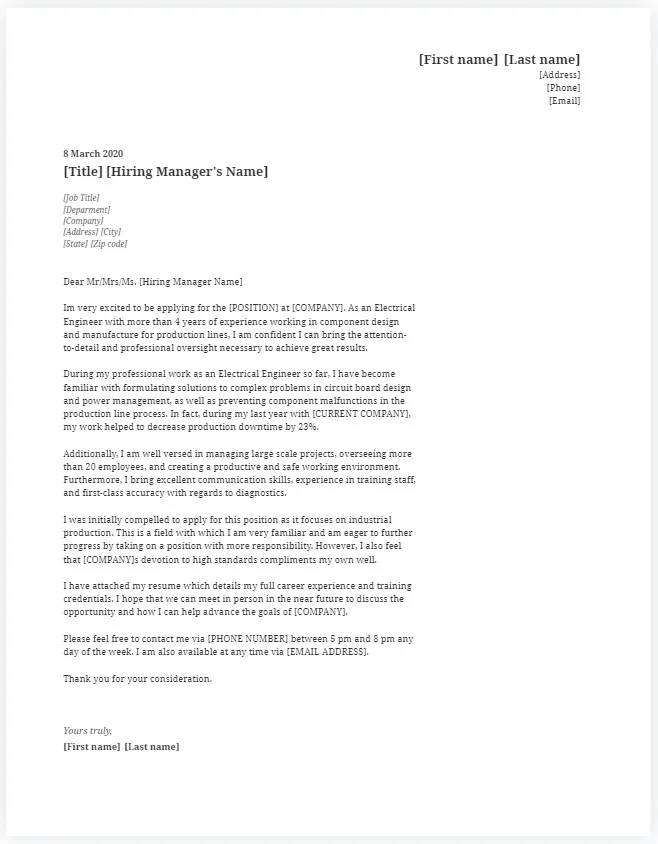
Describe your involvement in relevant projects, including your role, the challenges you faced, and the outcomes achieved. Focus on projects that demonstrate your skills and expertise in the specific areas required by the job.
Example 5 Chemical Engineer Cover Letter
A chemical engineer cover letter should focus on experience with chemical processes, process design, and related engineering principles. Highlight your knowledge of chemical reactions, thermodynamics, and fluid dynamics. Discuss your experience with process equipment, such as reactors, distillation columns, and heat exchangers. Showcase your ability to design, simulate, and optimize chemical processes. Provide examples of projects where you have successfully improved efficiency, reduced costs, or enhanced safety. Emphasize your understanding of industry standards and regulations, especially safety protocols. Discuss your experience with process control, instrumentation, or related technologies. Demonstrate your ability to work with cross-functional teams and your attention to detail. Mention any experience with sustainability or environmental engineering practices. Also, include any relevant professional certifications or licenses you hold. Chemical engineers should also be well versed in their specific industries.
Demonstrating Industry Knowledge
Showcase your knowledge of the chemical engineering industry, including relevant processes, technologies, and regulatory requirements. Focus on your awareness of industry trends, such as sustainability or advanced materials.
Highlighting Safety Awareness
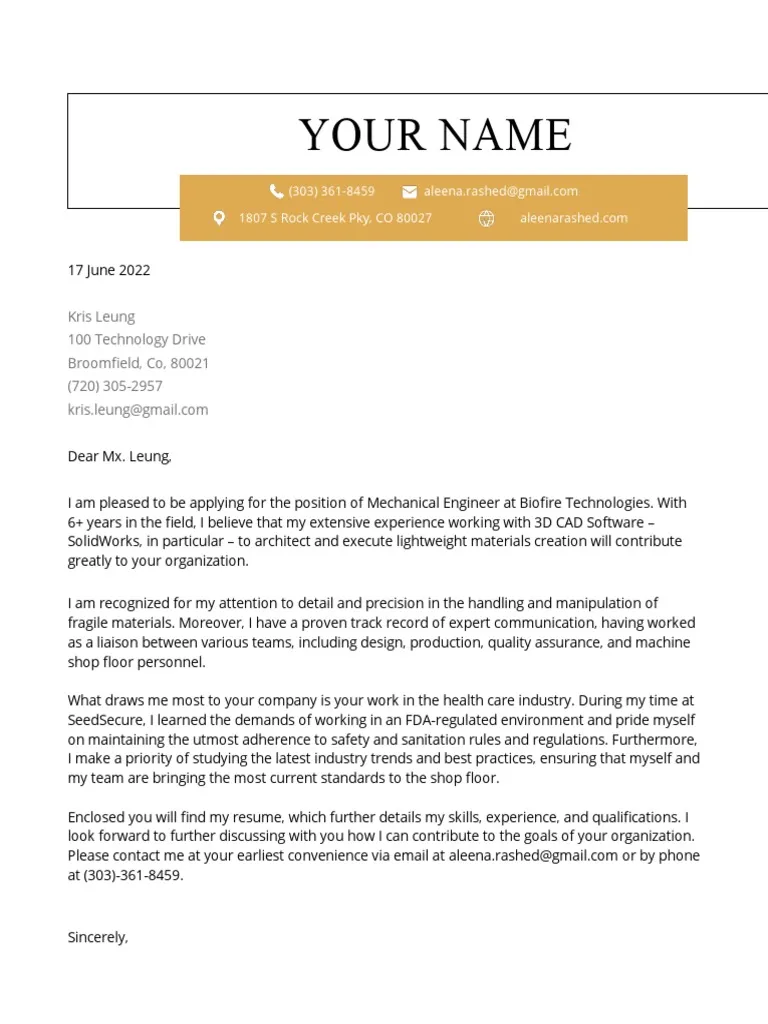
Emphasize your commitment to safety, including your experience with safety protocols, hazard analysis, and risk management. Highlight any experience with safety training or certifications.
Tips for Tailoring Your Cover Letter
Tailoring your cover letter is crucial for showcasing your relevance to the job. Begin by thoroughly reviewing the job description to identify the key requirements, skills, and experiences the employer is seeking. Use the job description as a guide to match your skills and experiences to the specific needs of the role. Address the key requirements directly, providing specific examples from your background. Research the company to understand its culture, values, and goals. Adapt your cover letter to reflect your understanding of the company, explaining how your qualifications align with its mission. Use keywords from the job description throughout your cover letter, making sure to incorporate them naturally. Personalize the letter to the hiring manager by addressing them by name. Before sending, make sure to tailor the cover letter, and customize it as needed.
Formatting and Design Considerations
The formatting and design of your cover letter are critical. Use a professional and easy-to-read font, such as Arial, Times New Roman, or Calibri, with a font size of 11 or 12 points. Maintain consistent formatting throughout the document, including spacing, margins, and headings. Keep your cover letter concise, ideally within one page. Divide your content into clear, well-defined sections with headings and subheadings. Use bullet points to highlight key skills, achievements, and responsibilities, making the information easy to scan. Use white space effectively to improve readability. Ensure your cover letter is visually appealing and easy to navigate. Choose a simple and professional layout that complements your resume. Use a consistent style for headings, fonts, and spacing. Proofread your cover letter carefully.
Proofreading and Editing
Proofreading and editing are the final, crucial steps in ensuring your cover letter is polished and effective. Carefully review your cover letter for any grammatical errors, typos, and inconsistencies. Check the spelling of the company’s name, the hiring manager’s name, and the job title. Read your cover letter aloud to identify awkward phrasing or sentences. Ask a friend or colleague to review your cover letter for feedback and suggestions. Ensure your letter is clear, concise, and easy to understand. Make sure your tone is professional and enthusiastic. Verify that your contact information is correct and up-to-date. A well-proofread cover letter demonstrates your attention to detail, and your professionalism, and increases your chances of landing an interview. Make sure your cover letter sounds well to others before you send it.
